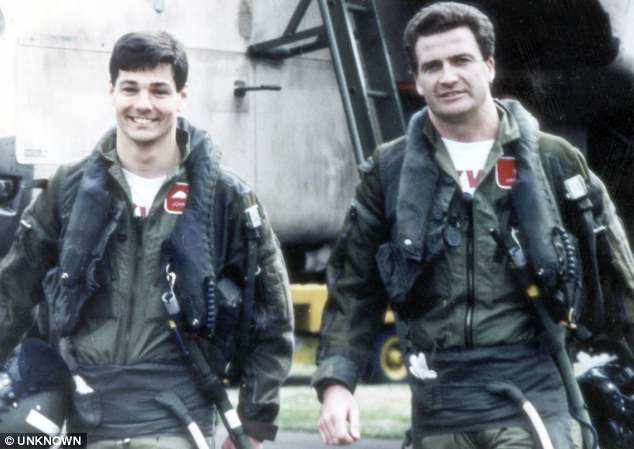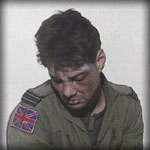- Having been shot down over Iraq in the Gulf War in 1991, RAF pilot John Peters has a down-to-earth view of his experience.
- He will be addressing Islanders at the Jersey War Tunnels on Wednesday
- Read our Saturday Interview with him below
JOHN PETERS is in between speeches at a function and is joking about having to drink water when everyone else is getting drunk.
He explains that he is due to run the London Marathon in a few days and is having to be careful.
The voice on the other end of the line is hard to reconcile with the image of Flight-Lieutenant John Peters’ bruised and battered face that was flashed across TV screens during the early days of the first Gulf War in 1991.
He was shot down in his Tornado along with his navigator John Nichol and was held and tortured by the Iraqi military for seven weeks before the two men were released.
They were paraded on television by the Iraqis and the shocking picture of Mr Peters’ face was one of the abiding images of the war.
Next week, Islanders will have the opportunity to meet the former RAF pilot when he appears at the Jersey War Tunnels as part of the Liberation 70 celebrations.
Among the topics covered in his talk will be those experiences as a prisoner of war.
‘I’ll be touching on that because I’ve obviously been involved in war and it will be about some of my experiences,’ he said.
‘But it’s also about the importance of how war remains with us all – as shown by the Jersey War Tunnels and the anniversary of the Island’s Liberation. It’s about the relevance of remembering the contributions and sacrifices of people in war.’

Although he is described as motivational speaker, Mr Peters hesitates to give himself that description.
‘I go around and tell my story and people say it’s motivational. But I just talk about what it’s like to go to war. These days, people experience war vicariously on television.
‘People now see war on television very differently from the way their grandparents experienced it, so I try to connect the current generation with some personal experience of what it’s like to go to war. Obviously I went to war, was shot down, was captured, but I’m one of the lucky ones because I managed to return,’ added Mr Peters, who is very matter-of-fact when he runs through his terrifying experience.
‘It was the first day of the war, 17 January, and I was flying a Tornado to attack an airfield to the west of Baghdad. I was coming off the target, coming home, and a missile went up my right-hand engine and exploded. We were doing 500 knots (926 km/h) at 50 feet above the ground and it took out the engine.
‘Then anti-aircraft guns hit my right-hand wing and ignited the rocket propellant in my Sidewinder missiles.
‘A torch of flame shot out and started to cut the wing off, so I flew for three or four minutes trying to get as far back home as I could, trying to solve the problem, but the aircraft became a ball of flames.
‘We ejected into the desert. We were there for two to three hours before we were captured by Iraqi soldiers. We were lucky we weren’t killed there and then.
‘We spent the next seven weeks in Baghdad, in solitary confinement, and were beaten with baseball bats and rubber truncheons. Our hair was set on fire, we were burnt with cigarettes. I lost two and a half stone in seven weeks, was threatened with gang rape, all that sort of stuff. But I’m one of the lucky ones because I eventually was released. I got back to England, resumed flying six weeks later as a normal Air Force pilot and stayed for another ten years.’

Mr Peters maintains that the experience didn’t change him, and on his return, apart from continuing his flying career, he and Mr Nichol wrote the best-selling book Tornado Down. Mr Peters retired from the RAF in 2000, but still keeps in touch with his former navigator and the other prisoners of war.
‘People talk about John and me, but we weren’t the only prisoners of war – there were another five RAF guys, but no one talks about them. We get together once a year just to celebrate that we’re still alive.
‘People always ask me if it was difficult to come back to normality. No, the difficulty was going to abnormality, the difficulty was going back to a place where they torture you. It’s easy coming back to somewhere where they feed you and people are nice. I’ve not lost one wink of sleep, no post- traumatic stress, nothing. The moment I got back, I was fine.
‘You are redefined because up to that point I was a fighter pilot, and then obviously I was a prisoner of war. Through that, and because of the pictures, you get labelled a hero, but that’s not my way of thinking. These are other people’s words – and that’s difficult to live with.
‘You get all the letters. I answered thousands, and they continue. I suppose you have fame and you have media interest and all that sort of thing, and you have to adjust to it very quickly. But of course it affected my life, because John Peters isn’t very interesting but for the fact that he was shot down. I’m no more and no less interesting than anybody who has a normal life.’
Mr Peters, now 53, may not live up to people’s label of him as a hero, but he has managed to get on with his own life.
- An audience with John Peters is on Wednesday 6 May at the Jersey War Tunnels.
- There are two sittings at 6 pm and 8 pm.
- The audience will have the chance to ask questions.
- Tickets are £35 and a collection will be taken for the British Red Cross.
- Tickets can be booked here or by calling 860808.
‘I run Monkey Business, which is a management consultancy. I look at leadership strategy and change, mainly with senior teams and boards of companies, and help them to solve problems,’ said Mr Peters who lives Worcestershire with his wife Helen and two children – Guy, who is 26 and an army officer, and daughter Toni (24), who runs an event management business.
Next week Mr Peters will be Jersey for his talk and to answer any questions people may have.
‘The questions most people ask are about how Helen coped with it, about post-traumatic stress, how I was released, and whether or not I’ve changed,’ said Mr Peters who is also asked what he would do if he met the people who captured and tortured him.
The answer to that is: ‘Nothing – it’s war. What are you going to do to someone who’s dropping bombs on you?
‘Even though in international law they did illegal things to me, you think, I hope I’m a nice man – I’ve got a beautiful wife and children. But so have they. It’s called war. I find myself detached from it. We are just playing roles.
‘And actually, without wishing to sound glib, war is a business at the end of the day.’






